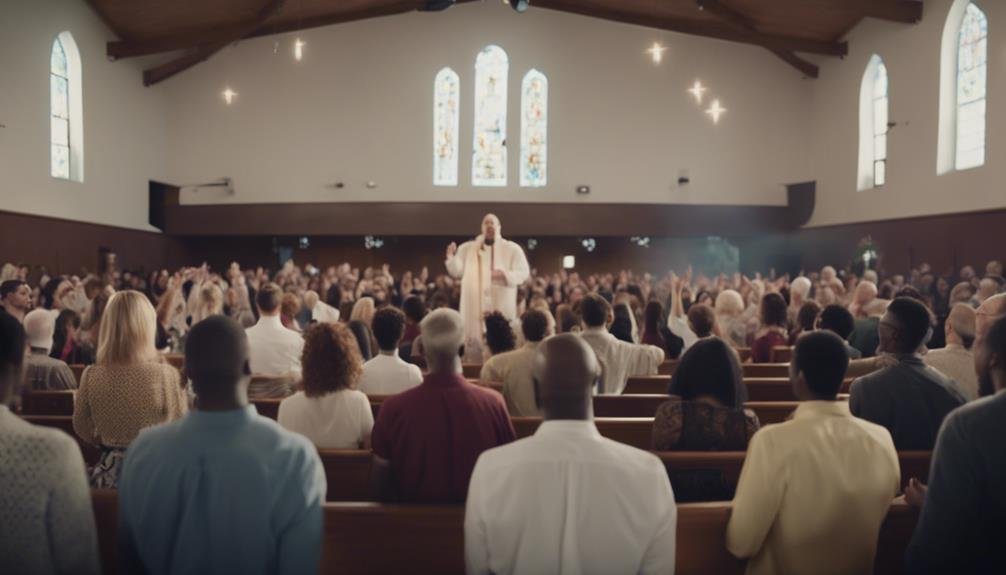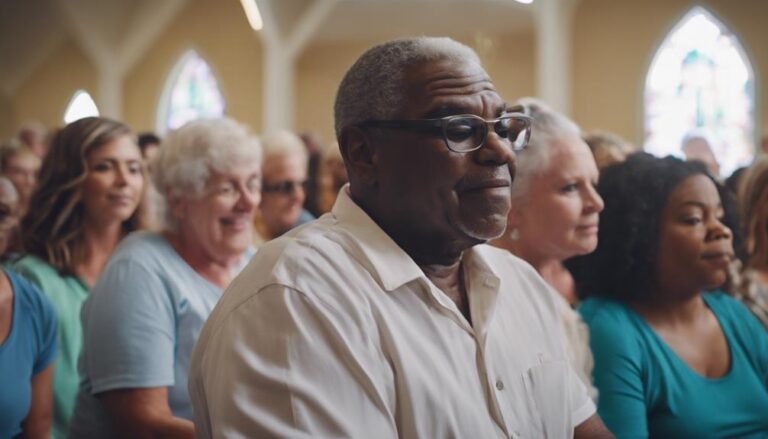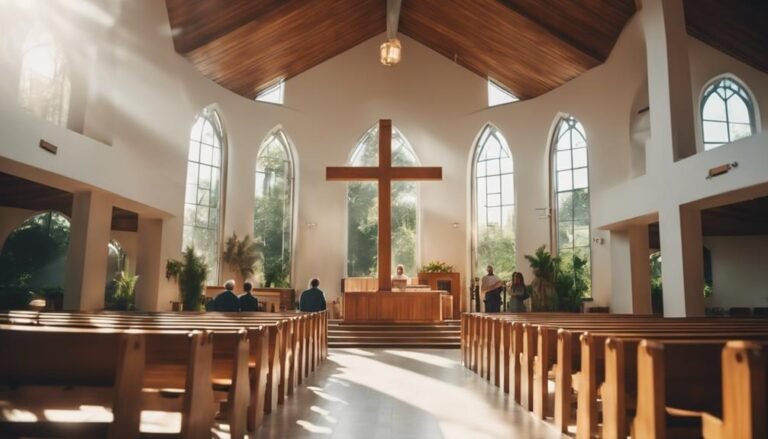Difference Between Non-Denominational and Baptist: Non-denominational churches prioritize personal relationships with God, while Baptist churches emphasize the authority of scripture and believer’s baptism. Non-denominational churches offer flexibility in doctrinal beliefs, contrasting with Baptist churches’ structured confessions of faith. Baptists have hierarchical leadership with ordained ministers and deacons, whereas non-denominational churches follow a more fluid leadership structure aligned with the church’s vision. Worship styles differ, with non-denominational churches favoring contemporary music and informal worship, while Baptist churches incorporate traditional hymns and value reverence. These differences in core beliefs, church governance, and practices shape the distinct identities of non-denominational and Baptist churches.
Key Takeaways
- Non-Denominational churches emphasize personal relationships with God, while Baptists prioritize scripture authority and believer’s baptism.
- Baptist churches have structured beliefs outlined in confessions of faith, while Non-Denominational churches have a flexible doctrinal approach.
- Baptist churches have a hierarchical authority structure, whereas Non-Denominational churches practice congregational autonomy.
- Baptists practice believer’s baptism, while Non-Denominational churches may practice infant baptism.
- Non-Denominational churches lean towards contemporary worship, while Baptist churches often incorporate traditional hymns.
Core Beliefs
Non-Denominational churches typically emphasize personal relationships with God and focus on the teachings of the Bible, while Baptist churches often prioritize the authority of scripture and the importance of believer’s baptism. Despite these differences, there are significant theological similarities between the two.
Both Non-Denominational and Baptist churches hold fundamental Christian beliefs such as the Trinity, the divinity of Jesus Christ, salvation through faith, and the second coming of Christ.
However, doctrinal differences do exist. Non-Denominational churches tend to have a more flexible approach to doctrinal beliefs, often allowing for diversity in interpretations of certain theological issues. On the other hand, Baptist churches have more structured beliefs outlined in their confessions of faith and doctrinal statements.
These doctrinal differences can sometimes lead to varied practices within the two denominations. Non-Denominational churches may have a more relaxed approach to certain rituals and ceremonies, while Baptist churches often adhere more strictly to traditional Baptist practices.
Despite these differences, both Non-Denominational and Baptist churches provide a sense of belonging and community for their members.
Church Governance
In contrast to their theological similarities, Baptist churches and Non-Denominational churches diverge in their approach to church governance. Baptist churches traditionally have a hierarchical authority structure, where decisions are often made by a governing body, such as elders or deacons. This model emphasizes a top-down leadership structure, where authority flows from the leadership to the congregation.
On the other hand, Non-Denominational churches typically adopt a congregational autonomy approach, where members of the church play a more active role in decision-making processes. In this model, the congregation has a greater say in the direction of the church, with decisions being made through a more democratic process involving the entire body of believers.
This emphasis on congregational autonomy fosters a sense of community and shared responsibility among members, giving them a greater sense of ownership over the church’s direction.
Sacraments and Practices
The differences between the sacraments and practices observed in Baptist and non-denominational churches provide insight into the distinct theological emphases and worship traditions of these Christian communities.
One significant contrast lies in Baptism. Baptists typically practice believer’s baptism, where individuals make a conscious decision to be baptized as a symbol of their faith. In contrast, non-denominational churches may practice infant baptism, viewing it as a sacrament that initiates the child into the Christian community.
Regarding the Eucharist, variations exist as well. In Baptist churches, the Eucharist, also known as the Lord’s Supper, is often seen as a symbolic act of remembrance, focusing on the Last Supper and Christ’s sacrifice. Non-denominational churches may approach the Eucharist with more flexibility, sometimes viewing it as a time of spiritual communion or as a symbolic representation of Christ’s presence.
These differences in baptism and Eucharist practices reflect the diverse theological perspectives and worship styles present in Baptist and non-denominational churches, shaping the spiritual experiences and community dynamics within each congregation.
Clergy and Leadership
Clergy and leadership structures play a pivotal role in shaping the governance and spiritual direction of both Baptist and non-denominational churches. In Baptist churches, clergy leadership often involves pastors who are ordained ministers with theological training. These pastors are typically responsible for preaching, teaching, and pastoral care within the congregation. Deacons may also play a significant role in supporting the pastor and assisting with the administration of the church.
Non-denominational churches, on the other hand, may have a more fluid leadership structure. Leadership roles are often filled by individuals who demonstrate a strong commitment to the church and possess qualities deemed important by the congregation. Qualifications for leadership in non-denominational churches may vary widely, with an emphasis on spiritual maturity and alignment with the church’s vision and values.
When it comes to decision-making processes, Baptist churches often adhere to a more hierarchical structure, where the pastor and deacons have significant influence. In contrast, non-denominational churches may adopt a more democratic approach, involving the congregation in major decisions through voting or consensus building.
Ultimately, both types of churches aim to have leadership structures that guide the community in alignment with their beliefs and values.
Worship Style

Within the context of religious practices, the worship style in both non-denominational and Baptist churches reflects their distinct theological perspectives and cultural influences. Non-denominational churches often lean towards a contemporary music style in their worship services. This includes upbeat songs with modern instrumentation, creating a lively and engaging atmosphere for worshippers.
On the other hand, Baptist churches frequently incorporate traditional hymns into their worship services. These hymns are deeply rooted in history and theology, providing a sense of continuity with the past and a connection to the broader Christian tradition.
The choice of worship style in each type of church is closely tied to their beliefs about worship: non-denominational churches often prioritize a more informal and spontaneous approach, while Baptist churches tend to value reverence and tradition in their worship services. Understanding these differences can offer insight into the unique worship experiences found in non-denominational and Baptist churches.
Relationship With Other Churches
Interactions between non-denominational and Baptist churches often reveal distinct approaches to their relationships with other denominations. Non-denominational churches typically have a more flexible stance towards interfaith partnerships and ecumenical relations. They often emphasize unity among believers regardless of specific doctrinal differences, fostering a spirit of inclusivity and cooperation with various Christian denominations.
Non-denominational churches may actively seek out opportunities to collaborate on community projects, charitable initiatives, and joint worship services with churches from different backgrounds. On the other hand, Baptist churches tend to maintain a more traditional approach, prioritizing doctrinal purity and adherence to Baptist beliefs. While Baptist churches may engage in ecumenical dialogues and partnerships to some extent, they’re often more cautious about compromising on core theological principles.
This difference in approach to interfaith relationships highlights the diverse ways in which non-denominational and Baptist churches navigate their connections with other Christian denominations, shaping their engagement with the broader religious community.
Views on Salvation

Diverging theological perspectives on salvation between non-denominational and Baptist churches shape their core beliefs and practices. Non-denominational churches often emphasize salvation by faith alone, viewing baptism as a symbolic act rather than a requirement for salvation.
Baptists, on the other hand, engage in a longstanding Baptism debate, believing that baptism is an essential step in the salvation process, representing a public declaration of one’s faith in Christ.
Moreover, the contrast between Grace vs works is central to understanding these differences. Non-denominational churches typically emphasize God’s grace as the sole means of salvation, while Baptists often stress the importance of good works as evidence of true faith.
This theological variance extends to the Predestination vs free will debate, with some Baptist denominations leaning towards a predestined view of salvation, while non-denominational churches often uphold free will in accepting or rejecting God’s offer of grace. These differing views on salvation influence how each group approaches evangelism, discipleship, and the Christian walk.
Frequently Asked Questions
Are Non-Denominational Churches More Modern in Their Approach?
When it comes to worship styles, non-denominational churches often lean towards a more modern approach, incorporating contemporary music and technology.
Community engagement is another key aspect, with a focus on outreach and inclusivity.
Leadership structure tends to be less hierarchical, fostering a sense of equality among members.
Theological beliefs may vary but generally emphasize personal relationships with God.
Do Baptists Allow Women to Serve as Pastors?
In Baptist churches, views on gender roles in pastoral leadership vary.
While some Baptist denominations don’t allow women to serve as pastors due to interpretations of biblical teachings, others are more inclusive.
This diversity in church hierarchy regarding female pastors stems from differing theological perspectives and traditions within the Baptist faith.
As a result, it’s essential to research specific Baptist congregations to determine their stance on women in pastoral roles.
Can Non-Denominational Churches Baptize Infants?
When it comes to infant baptism, non-denominational churches typically follow the belief that baptism should be a personal choice made by individuals who understand its significance.
This contrasts with some other denominational practices that may baptize infants as a part of their religious traditions.
Denominational differences in beliefs and religious practices can shape how each group approaches sacraments like baptism, reflecting their unique theological perspectives and interpretations of scripture.
Do Baptists Believe in Speaking in Tongues?
Baptists generally don’t believe in speaking in tongues as a regular practice in worship. This stems from their theological differences with Pentecostal influences.
While some Baptists may have charismatic beliefs, speaking in tongues isn’t a common aspect of Baptist worship practices. However, there are exceptions where individuals within Baptist churches may experience speaking in tongues, but it isn’t a widespread or encouraged practice in most Baptist congregations.
Are Non-Denominational Churches More Inclusive of Lgbtq+ Individuals?
Non-denominational churches tend to be more inclusive of LGBTQ+ individuals compared to Baptist churches. This acceptance stems from their emphasis on personal interpretation of scripture rather than strict adherence to traditional beliefs.
Non-denominational congregations often prioritize love and acceptance for all, creating an environment where LGBTQ+ individuals may feel more welcomed and supported in their faith journey. This openness contributes to a sense of belonging and community within non-denominational settings.
Conclusion
To sum up, while non-denominational churches and Baptist churches share some core beliefs, they differ in their church governance, sacraments, clergy, worship style, and views on salvation.
For example, a non-denominational church may focus more on individual interpretation of scripture, while a Baptist church may place a stronger emphasis on traditional practices and beliefs.
These differences contribute to the unique identities and practices of each denomination, shaping the experiences of their members and communities.






